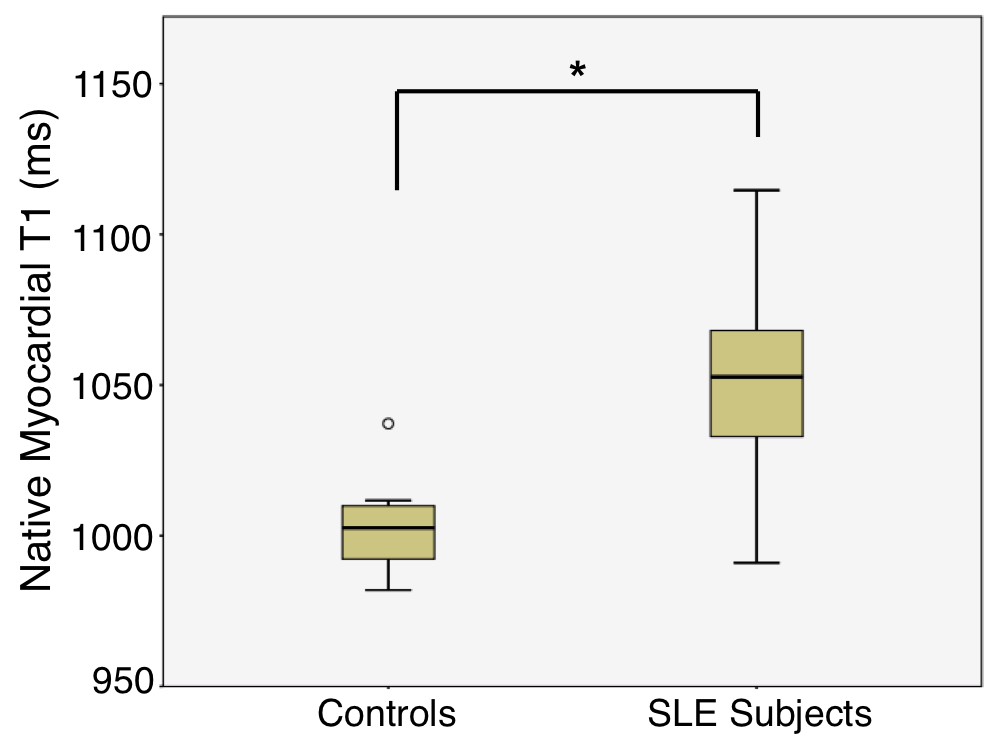Session Information
Date: Monday, November 9, 2015
Title: Systemic Lupus Erythematosus - Clinical Aspects and Treatment Poster Session II
Session Type: ACR Poster Session B
Session Time: 9:00AM-11:00AM
Background/Purpose: SLE patients often exhibit
signs and symptoms of cardiac ischemia with an overall increased prevalence of coronary
artery disease (CAD), microvascular dysfunction and myocarditis in this
population. Potentially, these processes may be associated with subclinical
changes in myocardial tissue. Elevated native myocardial T1, a cardiac magnetic resonance
imaging (CMRI) measure of myocardial fibrosis, has previously been shown in
asymptomatic SLE patients, implying subclinical myocardial disease. We assessed the hypothesis that
native myocardial T1 would be abnormally elevated in SLE subjects with chest
pain.
Methods: We evaluated 13 women with SLE,
chest pain but no obstructive coronary disease and 7 matched normal controls
using native T1 mapping at 1.5T (Siemens Avanto) CMRI with a 5(3)3 MOLLI
sequence in a single mid-ventricular slice. Healthy controls had a normal
exercise stress test and no history of cardiovascular disease.
Results: The healthy control group (n=7)
and SLE group (n=13) were well matched in age (47.9±9.2 vs 46.4±11, p=0.773) and BMI (24.8±2.6 vs 26.0±7.6, p=0.710). Eight SLE subjects
had current or past corticosteroid use and 7 had current or past use of a cytotoxic
agent. Average SLE duration was 19.5 years. Native myocardial T1 values were
increased in the women with SLE and chest pain compared to reference control
women (1049.4±34.3 vs 1003.8±18.9 milliseconds, p=0.005). No significant
relationship was shown between native myocardial T1 and age, BMI, disease
duration, or SLEDAI. However, native myocardial T1 positively correlated with corticosteroid
use (r=0.507, p=0.077) as well as the use of cytotoxic agents (r=0.495,
p=0.086).
Conclusion: Among women with SLE, chest pain, and no obstructive coronary
disease, native myocardial T1 measured by CMR is consistent with diffuse
fibrosis compared to controls.
To cite this abstract in AMA style:
Shaw J, Ishimori ML, Sandhu VK, Sharif B, Thomson L, Li D, Schapira J, Wallace D, Bairey Merz N, Weisman M, Berman D. Myocardial Tissue Characterization with Native Myocardial T1 Mapping in SLE Patients with Chest Pain [abstract]. Arthritis Rheumatol. 2015; 67 (suppl 10). https://acrabstracts.org/abstract/myocardial-tissue-characterization-with-native-myocardial-t1-mapping-in-sle-patients-with-chest-pain/. Accessed .« Back to 2015 ACR/ARHP Annual Meeting
ACR Meeting Abstracts - https://acrabstracts.org/abstract/myocardial-tissue-characterization-with-native-myocardial-t1-mapping-in-sle-patients-with-chest-pain/

